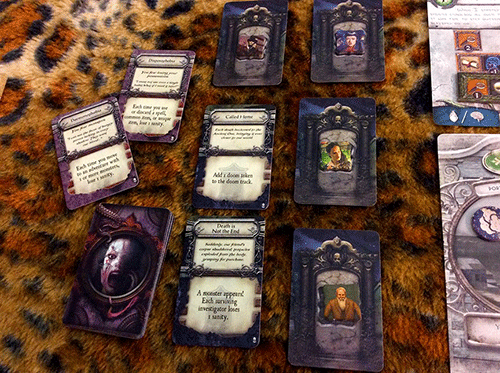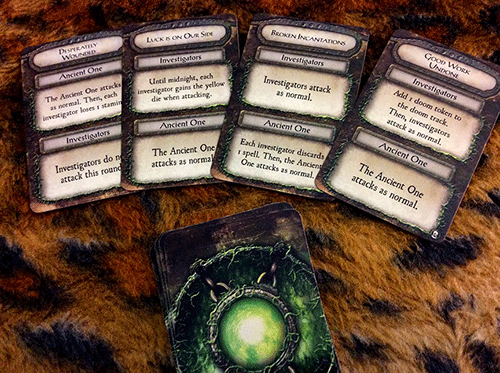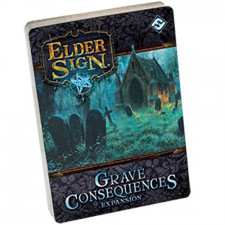Elder Sign: Grave Consequences Review
on Aug 11, 2016
Elder Sign is dead. Long live Elder Sign.
The original Elder Sign concept—rolling dice and taking names in an Arkham museum after hours—got the kiss of death from the two most recent expansions, Gates of Arkham and Omens of Ice, both of which introduced new, scenario-specific game modes with more compelling challenges, making the original museum adventures and mythos cards obsolete. A departure from these fleshed-out, game-changing expansions, Grave Consequences is Elder Sign's first print-on-demand mini-expansion, introducing three modular decks that can be added to any existing game mode.

Also a departure from the out-of-the-park success of the last two expansions, this one's hit-and-miss. Two of the three new decks are cool, if situational, while the last one is an unspeakable disappointment.
Let's start with the good. As the title implies, Grave Consequences focuses on making failure a bit more interesting. All three decks enter play only if the investigators screw up: by running out of sanity, getting devoured, or the ultimate failure, allowing the Ancient One to awaken. As such, you won't see them in every game, particularly the lower-difficulty setups.
When you do screw up, though, Grave Consequences "rewards" you with a bit of narrative and a tiny increase in challenge. For instance, when an investigator is devoured, after adding a doom token to the track but before drawing a new investigator, you now must draw and resolve an epitaph card. Epitaph cards are fairly evenly split between positive and negative effects: "Mourn Not My Death" lets all surviving investigators regain 1 sanity and 1 stamina, while "Death Is Not the End" spawns a monster and makes everyone lose 1 sanity. Some are mixed blessings, some are low-impact, and some are severe, especially "Called Home" (add a doom token to the doom track) and "Here Lies a Scholar" (lose an Elder Sign).
After resolving the card, you put the dead investigator's token on the front, which shows a picture of a tombstone. This memorial to the fallen is probably the best part of the whole expansion, even though it does nothing in terms of gameplay. In those really unlucky games, the visual impact of the tiny plot of gravestones lingering near the adventures adds a personal, emotional stake to the battle against the Ancient One.

Phobia cards, inspired by the Madness cards used in practically every other Arkham universe game, replace the original penalty for losing all your sanity—getting devoured—with a lasting, debilitating effect. The original rules were always counterintuitive (nobody dies from going insane, at least not directly), so this is a big improvement already. It also makes the game a bit harder in most situations: instead of replacing your beat-up investigator with a fresh new one, you get to keep rolling with the same bruised, broken identity plus a serious mental handicap. Most phobia cards add new conditions that cause you to lose sanity, increasing the odds you'll draw another one...and even though your investigator is no longer devoured, you still add a doom token every time this happens. The phobias are diverse and maniacal, punishing you for moving to certain adventures, gaining Elder Signs, or using items and spells, forcing the entire team to begrudgingly indulge your insecurities.
The weak link in this expansion is the Epic Battle deck. Inspired by Arkham Horror's deck of the same name, the Epic Battle cards alter the rules for fighting the Ancient One on a round-by-round basis. There are a number of reasons these don't work. One, they simply complement all Ancient Ones equally. Many of the cards cause investigators to gain or lose sanity, which does nothing if the Ancient One's attack doesn't deal damage in this way. Two, they lack the feature that made Arkham Horror's Epic Battle cards so successful: the AO-specific cards, further developing each Ancient One's unique personality. Without these, the Epic Battle cards actually make each Ancient One fight feel more generic. It also draws out the fight without any noticeable payoff.
Although a third of the expansion is a dud, the other two decks are a fun way to deepen the narrative of your game, especially when things go wrong. Less must-buy, more might-as-well.

 Customer Support
Customer Support  Subscribe
Subscribe 




 Account
Account  Wishlist
Wishlist 

